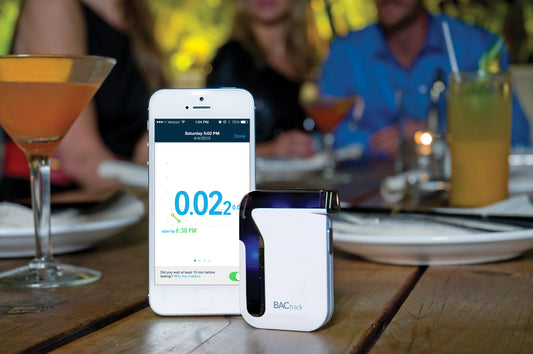Understanding Breathalyzer Sensor Types
Understanding Breathalyzer Sensor Types
Most breathalyzers use either fuel cell sensor technology or semiconductor oxide sensor technology to measure the blood alcohol content (BAC) in a person's blood.
Xtend® Fuel Cell Sensor Technology
Breathalyzers with fuel cell sensors offer extremely high accuracy and sensitivity, and employ the same advanced fuel cell technology that is used by law enforcement for roadside alcohol testing, as well as in substance abuse centers, clinics, and businesses. Prices for fuel cell devices have come down in recent years, making them increasingly popular for personal use.
Fuel cell sensors rely on an electrochemical process that oxidizes the alcohol in a breath sample. The oxidization produces an electrical current that the breathalyzer measures to determine the BAC. The strength of the current corresponds to the volume of alcohol present in the sample.
If you want the highest level of accuracy in your readings - the most precise measurement of your BAC - a professional level breathalyzer that uses fuel cell sensor technology would best suit you.
If you want the highest level of accuracy in your readings - the most precise measurement of your BAC - a professional level breathalyzer that uses fuel cell sensor technology would best suit you. BACtrack's Professional Series models use fuel cell sensor technology, specifically, BACtrack’s proprietary Xtend® Fuel Cell Sensor Technology, which has been engineered to offer more consistent and accurate results over the complete range of alcohol concentrations, from 0.000 to 0.400% BAC, and optimized for long-term reliability.
We highly recommend our Professional Series breathalyzers. All these units are equipped with advanced Xtend® Fuel Cell Sensor Technology.
- BACtrack Mobile - The smallest of our fuel cell models wirelessly connects to iOS smartphones and tablets to offer accuracy in addition to a range of powerful tracking and sharing features.
- BACtrack S80 Pro – Has the largest fuel cell sensor in our professional line and remains accurate for a longer period of time – up to thousands of tests.
- BACtrack S75 Pro – Offers palm-of-the-hand comfort and ease of use; maintains all the accuracy benefits of the S80 Pro with a slightly smaller sensor.
- BACtrack Element– Easy, one-button operation for fast and reliable BAC results.
MicroCheck® Sensor Technology
Semiconductor Oxide sensors use a tin-oxide substance to measure BAC. A tin dioxide sensor heats a steel mesh film with a heater coil, and when exhaled alcohol hits the heated film, the resistance is changed. The change in sensor resistance is measured as the change of the output voltage across the fixed or variable resistor. There is a direct relationship between the sensor resistance and alcohol concentration.
For personal, home, and low-volume professional testing, MicroCheck® Sensor Breathalyzers offer users a high level of accuracy and reliability.
Breathalyzers with semiconductor sensor technology are less accurate than those with fuel cell sensors, and they are less expensive.
BACtrack breathalyzers that do not employ fuel cell sensors utilize BACtrack’s proprietary MicroCheck® Sensor Technology. Using a semiconductor sensor as a base, these sensors go through a patented burn-in process that equalizes the response, for higher performance and more accurate, reliable results when compared to standard semiconductor sensors.
For personal, home, and low-volume professional testing, MicroCheck® Sensor Breathalyzers offer users a high level of accuracy and reliability.
The following BACtrack Breathalyzers employ MicroCheck® Sensor Technology:
- BACtrack Vio - BACtrack's newest smartphone breathalyzer with an ultra-compact keychain design.
- BACtrack S35 – Sleek and compact palm-of-hand unit for personal use.
- BACtrack T60– Slim, easy to use breathalyzer with collapsible mouthpiece design.
- BACtrack Keychain – Affordable with a take-anywhere small, sturdy design.




